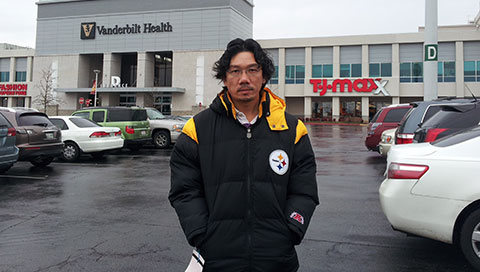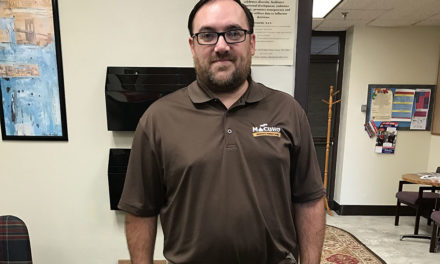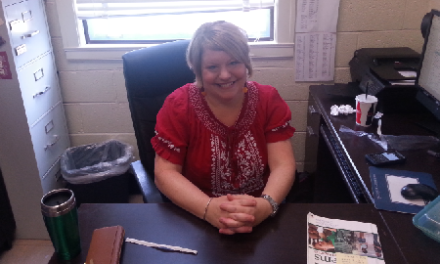By Taylor Broomall (Whetstone Staff)
Taylor Broomall: I know it’s a given name, but how did you get the name Oak?
 Oak Pongsree: Yes, Oak is a given name at birth by my parents. The story is that I was conceived in a town in Tennessee an hour outside of Nashville. Almost every weekend during the pregnancy, for about 6-7 months, my parents would go to this mall in Nashville to look at baby stuff. The name of the mall is “One Hundred Oaks.†So when I was born, they named me after that mall.
Oak Pongsree: Yes, Oak is a given name at birth by my parents. The story is that I was conceived in a town in Tennessee an hour outside of Nashville. Almost every weekend during the pregnancy, for about 6-7 months, my parents would go to this mall in Nashville to look at baby stuff. The name of the mall is “One Hundred Oaks.†So when I was born, they named me after that mall.
TB: What’s your background?
OP: I was born in Thailand. I am Thai. I have family in Michigan, so I call that home as well.
TB: How long have you been teaching at Wesley?
OP: I am finishing my seventh year at Wesley. I started teaching in 1998 so I am finishing my fifteenth year overall.
TB: What’s your educational background?
OP: I have a Bachelor’s degree in Electrical Engineering, an MBA, an M.A. and a Ph.D. in Economics from Michigan State University.
TB: What did you want to do (career, hobbies) while growing up?
OP: I played a lot of soccer, basketball, and tennis while growing up. I also had a band – I played the guitar. So, growing up, I wanted to be either a rock star or a sports star. Evidently, it didn’t work out. I never thought I’d be teaching anything, much less what I am teaching now.
TB: What class do you enjoy teaching most?
OP: Generally any upper-level economics class. Students at that level usually have developed enough thinking ability to engage in all sorts of dialogues about social issues we face.  But that’s an extremely generalized statement because I have had students at the graduate (MBA) level that are not willing to think and dialogue, and, at the same time, a few students at the lower-level economics who have been extremely willing and able to do so.
TB: What work, if any, have you published?
OP: I have served as a book editor. I am writing one on my own right now. Students and friends who bug me with questions that get me to think or just bother to have dialogues or debates with me in general will most likely see their questions and dialogues in my book.
TB: Would you like to pursue your engineering degree more?
OP: No. I still have license to practice electrical engineering in Michigan and a few surrounding states. But I find it rather boring to talk about electrons and stuff. The only fun part there was the math.
TB: How would your respond to students, and even teachers, who think your lessons a bit radical?
OP: I would ask them to define what “radical†means. And, it may be along the line of “non-mainstream,†or something they haven’t heard of, or haven’t thought about thoroughly. If so, I would ask them to give any idea, radical or not, a serious thought before dismissing it too quickly.
TB: What’s the most important trait you bring to the classroom?
OP: Passion about the subject is one. I think if professors are really deeply passionate about the subject, it can be contagious. I think I also bring an open mind. I think I am willing to listen to just about any idea and really give it a serious thought. I always give my students all sides of and have them sort them out by thinking on their own. I try to seed doubt in their minds so that they learn to not just accept things at face value. I also bring the idea that arguing or having dialogues or friendly debates – even if heated – is healthy.
TB: Why are you such a big fan of the Steelers?
OP: I could talk about my Steelers all day. My dad has always been a big football fan – He was a Cowboys fan (Now, that is gross!) in the ‘70s, and has been a 49ers fan (better) since Joe Montana. The first football game I watched with him was when I was about 5 or 6. The Steelers were playing the Raiders and the Raiders were kicking ass. So, I started rooting for the obvious underdog, Black ‘n’ Gold, and it stuck big time.
TB: What is the biggest challenge you face as a professor?
OP: To make students think instead of trying to memorize information. For curious students, they appreciate what I do. For students who just try to pass the class by memorizing a bunch of stuff, they usually hate how I teach because even when they got it right, I will say something to have them doubt that!
TB: What use can economics be to an everyday person? Why is it important that the students try and take something away from the class?
OP: First, (I am quoting Milton Friedman), “Most economic fallacies derive from the tendency to assume that one party can gain only at the expense of another.â€Â This is crucial to me because, unfortunately, a lot of policies that end up preventing less fortunate people from having a shot at making it were born out of the misconception that the poor are poor because others “gain at their expense.†Second, never presume, explicitly or implicitly, that your preference is universal. It causes you to point your fingers at other people.




